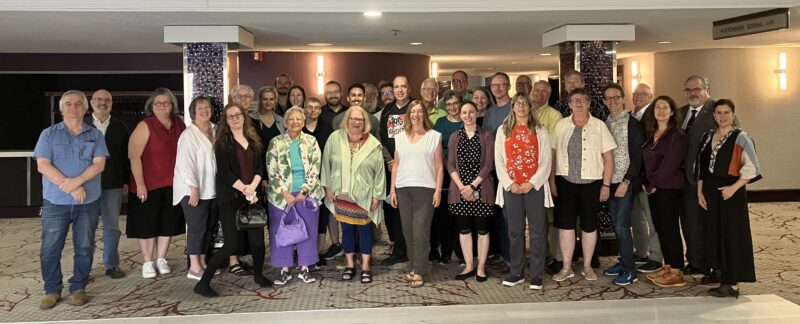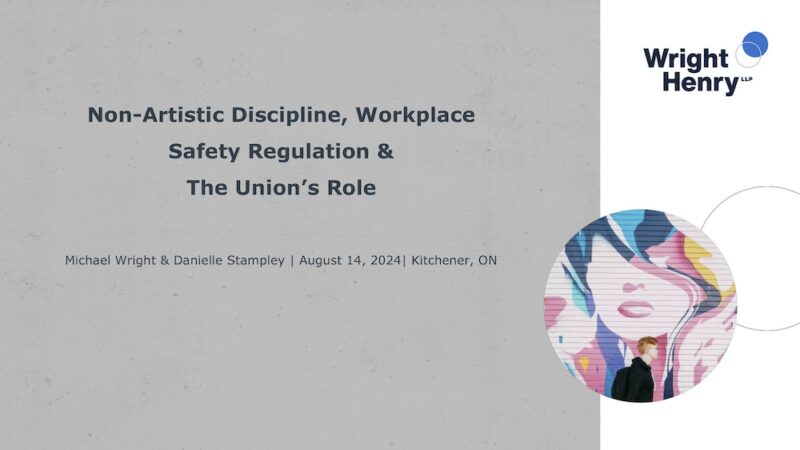
By Katherine Carleton, Executive Director of Orchestras Canada
In mid-August, a small group of orchestra management folks and I attended the annual conference of the Organization of Canadian Symphony Musicians (OCSM) in Kitchener, Ontario. OCSM describes itself as “a conference of the American Federation of Musicians of the United States and Canada (AFM) representing approximately 1100 musicians working under collective agreements in twenty-one Canadian orchestras,” and I’ve attended (and spoken at) their annual conference almost every year since 2005, when I began working with Orchestras Canada.
The open sessions at this year’s conference included several discussions of interest. Your colleagues and I agreed that we’d do well to share what we heard in those discussions. I’ll report on the following:

1- A panel presentation on the Kitchener-Waterloo Symphony
2- An update on the Musicians Pension Fund of Canada
3- A session led by Jaime Martino and Michael Mori of Tapestry New Opera about the Women in Musical Leadership program, and efforts they are making to improve inclusivity and respectful workplaces in classical music
4- A presentation by Michael Wright and Danielle Stampley of the Canadian Federation of Musicians (CFM) law firm Wright Henry LLP on Dismissal for Non-artistic Reasons
5- A presentation by Rochelle Skolnick, Director of AFM Symphonic Services and Special Counsel to the American Federation of Musicians on Changing the Union and Workplace Culture.
Kitchener-Waterloo Symphony Update
Delegates heard from three speakers about the situation of the Kitchener-Waterloo Symphony following the bankruptcy filing in September 2023. Presenters Katherine Robertson (Chair, Musicians of the KWS), Rebecca Diderrich (Member, Musicians of the KWS), William Poole (newly elected board president, Kitchener Waterloo Symphony Association Inc.), and Richard Sandals, associate director, Symphonic Services Division, Canada shared their perspectives – and it was a gripping tale.
We learned about the players’ impressive work over the course of the year to
- build and sustain unity of purpose among the musicians,
- keep professional orchestral music-making alive in KW by organizing and putting on concerts (initially as volunteers and later, using some of the resources raised through their wildly successful GoFundMe campaign – $487,945 from over 2600 donors – to pay musicians),
- decide between working to develop a proposal to settle the bankruptcy filing and revive the organizational structure, OR starting a brand-new legal structure,
- and (once that decision had been made)
- work with many different people and groups (with a particularly close partnership with the KWS Foundation) to clear the bankruptcy and reconstitute the Kitchener-Waterloo Symphony Orchestra Association Inc. (including recruiting a new board and holding a special meeting of members to elect a new board).
On behalf of the new board, Bill Poole reported that they were a strong and united group that was working hard to finalize the proposal to creditors, rebuild the organization’s working structure, ensure strong accountability to the community (What happened? When do we get orchestral concerts again? How do we ensure this never happens again?), and support and recognize the musicians’ hard work.
It was a moving and ultimately heartening presentation, and I know we’ll all be watching and supporting their progress in the months ahead.
Musicians Pension Fund of Canada presentation
Humbert Martins, Director of Pension Benefits at the MPFC, made a presentation about the current state of the fund. Among my gleanings:
- The MPFC is separate from the US-based AFM-Employers Pension Fund. Its oversight board is made up of both musician and employer directors;
- It is a multi-employer program (recognizing that musicians may have many employers and engagers over their careers), and offers a defined benefits pension to enrollees;
- The pension fund holdings are in good shape. The fund’s advisors are getting good rates of returns on their investments.
Interestingly, the percentage of pension fund contributions coming from Canadian orchestras has increased to over 50% of annual MPFC contributions over the years, as pensionable commercial recording and CBC sessions have declined.
The MPFC has a good website, but if you want to learn more, OC would be happy to organize an orientation session with Fund staff.

Changing the Culture: Inclusivity and Respectful Workplaces in Classical Music
Michael Mori (Artistic Director) and Jaime Martino (Executive Director) of Tapestry Opera provided delegates with an overview of Tapestry’s Women in Musical Leadership program, and their learnings since the program was launched.
Specifically, they wanted to explore the background to some of the attitudes expressed by orchestral musicians in their interaction with WiML conductors, as communicated through anonymous feedback surveys. Comments on hairstyle, tone of voice, and clothing choices were not uncommon – and neither the musicians sharing those comments nor the orchestra managements who passed them on – unfiltered – to WiML seemed to find this surprising or unusual. This led the Tapestry team to ask the obvious question: is there something in orchestral culture that normalizes the expression of gender bias?
A spirited discussion ensued, with thoughtful reflections from the players around the table about their career experiences, the evolution of attitudes over time, the importance of progressive and well-communicated workplace policies, and the value of training to support these policies, including bystander training.
Orchestras Canada has recently joined a Changing the Culture Workgroup, hosted by Tapestry – and we’ll share more in the months to come.
Dismissal for Non-Artistic Reasons
Lawyers Michael Wright and Danielle Stampley provided an overview of processes and responsibilities of CFM Locals and management in processes related to discipline (including dismissals) for non-artistic reasons. My three main takeaways?
- A strong, transparent, and (where possible) collaborative process between management and local is key and must be informed by relevant legislation and the collective bargaining agreement.
- The CFM has an ironclad “duty to represent” its members, whether the case is open and shut or not.
- Even if the process is impeccable, the CFM may well grieve a disciplinary action that it deems disproportionate or incorrect.
Rather than attempting to summarize the presentation, I’ll simply link you to their slide deck (with the reminder that the information provided is for background only and does not represent qualified legal opinion on any specific situation).
Sexual Misconduct in Symphonic Workplaces
Inspired by the recent reporting on events at the New York Philharmonic, and subsequent actions by the orchestra, Local 802, and AFM/CFM, the Director of Symphonic Services and Special Counsel to the AFM Rochelle Skolnick’s presentation included definitions of some key terms. As well, she underlined the specific responsibilities of institutional leaders, artists and workers and laid out a framework for concretely improving the symphonic workplace for all. Again, the discussion was engaged and lively: everyone around the table was clearly committed to more enlightened, progressive and respectful workplaces.
Her slide presentation is here – and I’d describe it as essential reading!
Feel free to reach out to me directly if you have any questions. I’m happy to hear from you!
Katherine Carleton
Executive Director
Orchestras Canada/Orchestres Canada
[email protected]

